Understanding the Significance of Transitional Care in Aging Populations
Care transitions, especially for the elderly, are pivotal moments that can profoundly influence mental health outcomes. From hospital discharges to moving between care settings, each transition carries potential risks and opportunities. Recognizing and addressing these factors is essential to promote mental resilience, reduce adverse events, and improve overall quality of life for older adults.
Overview of Care Transitions and Their Importance
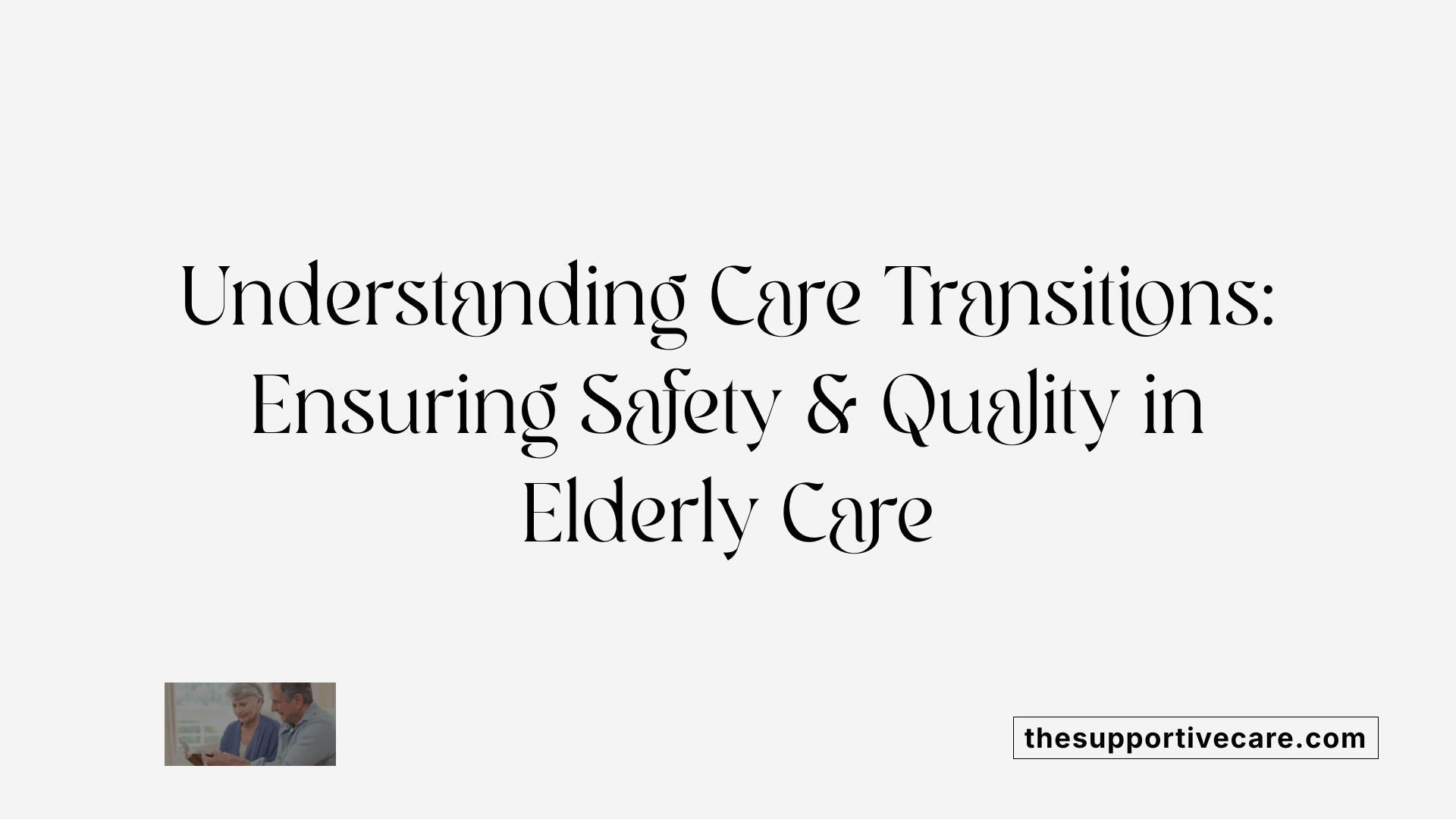
What are care transitions?
Care transitions refer to the movement of patients between different healthcare settings or providers, such as from hospital to home or between hospital wards. These shifts are critical points where the coordination of care must be seamless to ensure patient safety and quality outcomes.
Why do care transitions matter for elderly mental health?
For older adults, especially those with chronic conditions or mental health issues, care transitions can be especially vulnerable times. Fragmented care, miscommunication, and inadequate follow-up can lead to medication errors, rehospitalizations, and deterioration of mental health. Older adults may experience increased feelings of confusion, anxiety, and depression during these periods.
How do transitions impact the healthcare system and patient outcomes?
Effective management of care transitions can reduce hospital readmissions, lower healthcare costs, and improve patient satisfaction. Conversely, poorly managed transitions often result in duplicated services, conflicting recommendations, and avoidable medical complications. Studies indicate that interventions like nurse-led programs and structured follow-up can improve adherence, recall of discharge instructions, and engagement with outpatient care.
Effects of life transitions on elderly mental health
Major life changes such as retirement, bereavement, declining health, and living situation adjustments significantly influence mental health in late adulthood. Feelings of loneliness, grief, and loss of independence frequently lead to depression and anxiety. Supportive interventions, including psychological counseling and social engagement, are vital for helping older adults cope.
| Aspect | Impact | Example |
|---|---|---|
| Emotional well-being | Vulnerability to depression, anxiety | Bereavement increases grief and social withdrawal |
| Physical health | Stress exacerbates health issues | Mobility challenges cause emotional distress |
| System effectiveness | Better coordinated transitions improve mental health | Home follow-ups and patient education help maintain stability |
Strategies to improve care transitions for the elderly
Recent models such as the Transitional Care Model and community-based programs have shown promising results. These initiatives include in-home visits, medication reviews, social support activation, and improved communication among healthcare providers. Tailoring interventions to the needs of at-risk groups, especially those with mental health concerns, can foster better outcomes.
| Intervention Type | Effectiveness | Focus |
|---|---|---|
| Nurse-led transitional programs | Reduce hospital readmissions | Elderly with chronic and mental health issues |
| Community engagement | Improve health and well-being | Enhancing social and family support |
| Technology-based communication | Improve coordination | Sharing discharge information and follow-up |
Risks and Challenges of Care Transitions for Older Adults
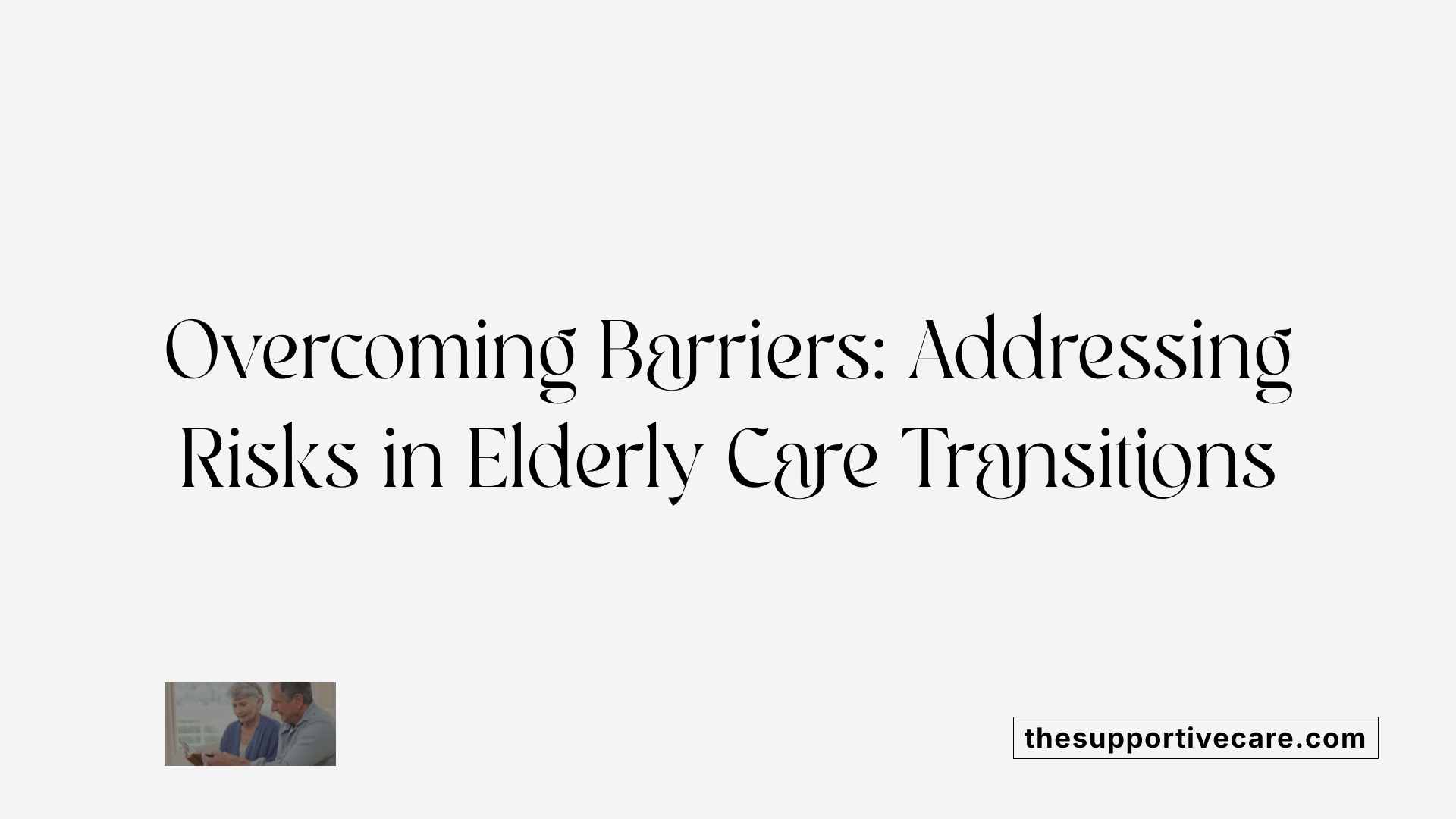
What are the risks and challenges associated with care transitions for older adults?
Transitions in healthcare, especially for older adults, involve moving between settings such as hospitals, outpatient clinics, and home care. These shifts are fraught with potential problems that can jeopardize patient safety and well-being.
One major challenge is miscommunication. When information is poorly transferred between providers or settings, it can lead to medication errors, duplicated tests, or conflicting care instructions. This confusion can be overwhelming for patients and their caregivers, especially when managing complex medication schedules or treatment plans.
Errors are another significant concern. Errors in medication management, misunderstanding of discharge instructions, or missed follow-up appointments can result in serious health complications. These mistakes may lead to adverse medical events like infections, medication side effects, or worsening of chronic conditions.
Hospital readmissions are common outcomes of poorly managed care transitions. Older adults often experience a decline in their quality of life when readmitted repeatedly, which can be caused by inadequate follow-up care or unaddressed health issues after discharge.
Research funded by organizations like PCORI highlights the importance of patient-centered approaches that include active involvement of patients and caregivers. Improving communication, enhancing coordination among healthcare providers, and tailoring interventions to individual needs are vital steps toward reducing these risks.
Addressing these challenges is crucial not only for patient safety but also for reducing healthcare costs and improving overall health outcomes during critical care transitions.
Impact of Age-Related Vulnerabilities
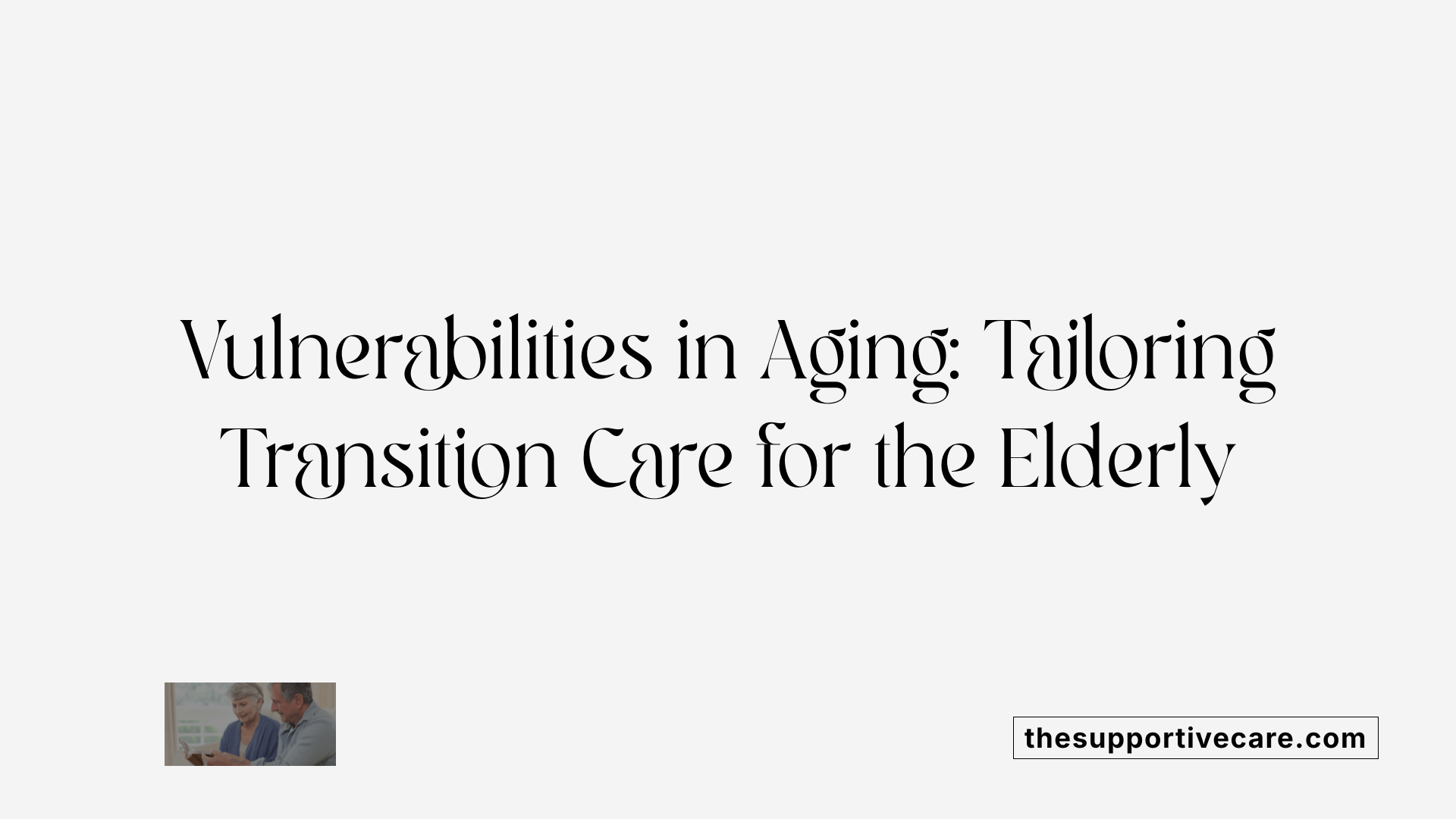
Why are transitions of care risky for older adults?
Transitions in healthcare pose significant challenges for older individuals due to various vulnerabilities associated with aging. Older adults often have multiple chronic health conditions, which complicate care management during transfers between settings like hospital, outpatient, or home care. These comorbidities increase the likelihood of medication errors, adverse drug interactions, and side effects, all of which can lead to serious health deterioration.
Cognitive impairments, common in this age group, further heighten the risk by affecting medication adherence, understanding discharge instructions, and recognizing warning signs that require medical attention. These impairments can lead to misunderstandings during handoffs and diminish the effectiveness of communication between healthcare providers, patients, and caregivers.
Systemic barriers and social determinants also play a role in complicating care transitions. Fragmented healthcare systems, incompatible electronic health records, and resource shortages especially in rural areas, hinder seamless information sharing and coordination. Social factors such as limited support networks, transportation issues, and social isolation increase vulnerability, making it more difficult for older adults to adhere to care plans and recognize when to seek help.
The combined impact of medical, cognitive, and systemic factors underscores the importance of tailored, comprehensive strategies during care transitions. Implementing assessment models focused on medication, cognitive, and mobility status—such as the 4-MS plus Safety and Social Support—along with clear verbal and written communication, can help reduce errors and adverse events.
Interventions like medication reviews, cognition and mobility assessments, goal-of-care discussions, and active involvement of family caregivers can improve safety and outcomes. Ensuring continuity of care and addressing social determinants are crucial to protecting older adults from the risks commonly associated with transitions in healthcare.
Models and Interventions to Improve Outcomes
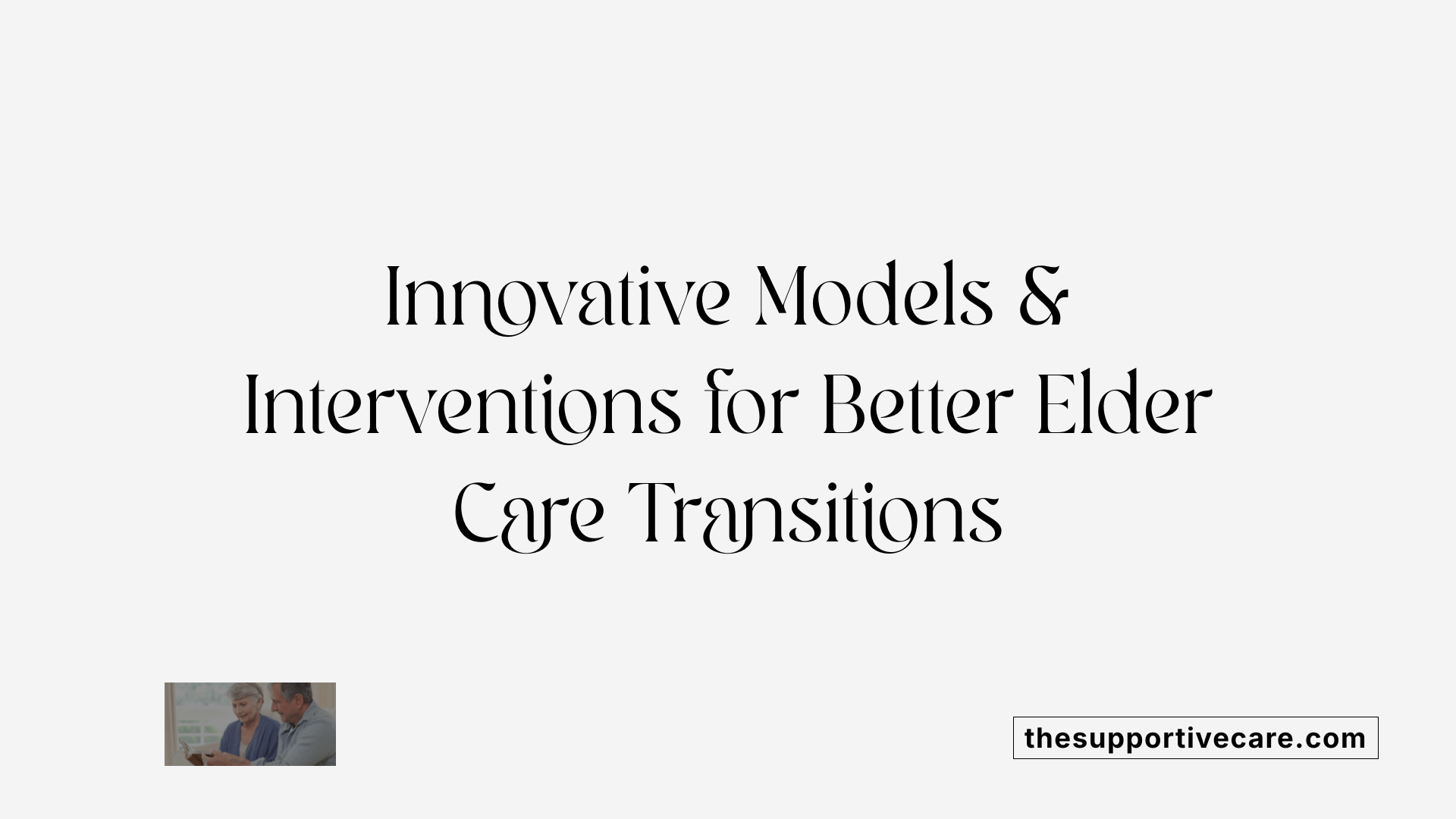
What interventions or models can improve mental health outcomes during care transitions?
Implementing structured and comprehensive transitional care models is vital to enhancing mental health outcomes among older adults during care transitions. The Transitional Care Model (TCM), developed by Mary Naylor, is a nurse-led approach that targets vulnerable, chronically ill seniors at risk for adverse outcomes as they move between hospitals and community settings. This model emphasizes personalized assessments, continuous follow-up, and coordination among healthcare providers, patients, and caregivers. Its core components include risk screening, maintaining relationships, patient and caregiver engagement, and ensuring seamless communication.
Similarly, the Care Transitions Intervention (CTI), developed by Eric Coleman, focuses on coaching patients and families through discharge, encouraging self-management, and promoting follow-up care. Both models demonstrate success in reducing rehospitalizations and improving patient experience by addressing medical, psychological, and social needs.
Recently, nurse-led and tailored programs have been shown to support individual recovery and mental health stability effectively. These programs often incorporate home visits, medication reviews, problem-solving therapy, education, and social support. By customizing interventions to patient-specific mental health challenges—such as depression, anxiety, or cognitive impairments—care teams can better manage psychosocial issues during vulnerable transition periods.
Technology also plays a pivotal role. Digital health tools and telehealth services allow ongoing monitoring of mental health symptoms, facilitate communication, and provide timely interventions when needed. Combining technological solutions with multidisciplinary, person-centered care ensures continuity, addresses psychosocial factors, and ultimately improves mental health outcomes during care transitions.
In summary, adopting integrated models like the TCM and CTI, complemented by tailored, nurse-led programs and innovative technology, promotes better mental health support. These approaches ensure that older adults receive holistic care that considers their emotional and psychological well-being during these critical periods.
Role of Policy and System-Level Initiatives
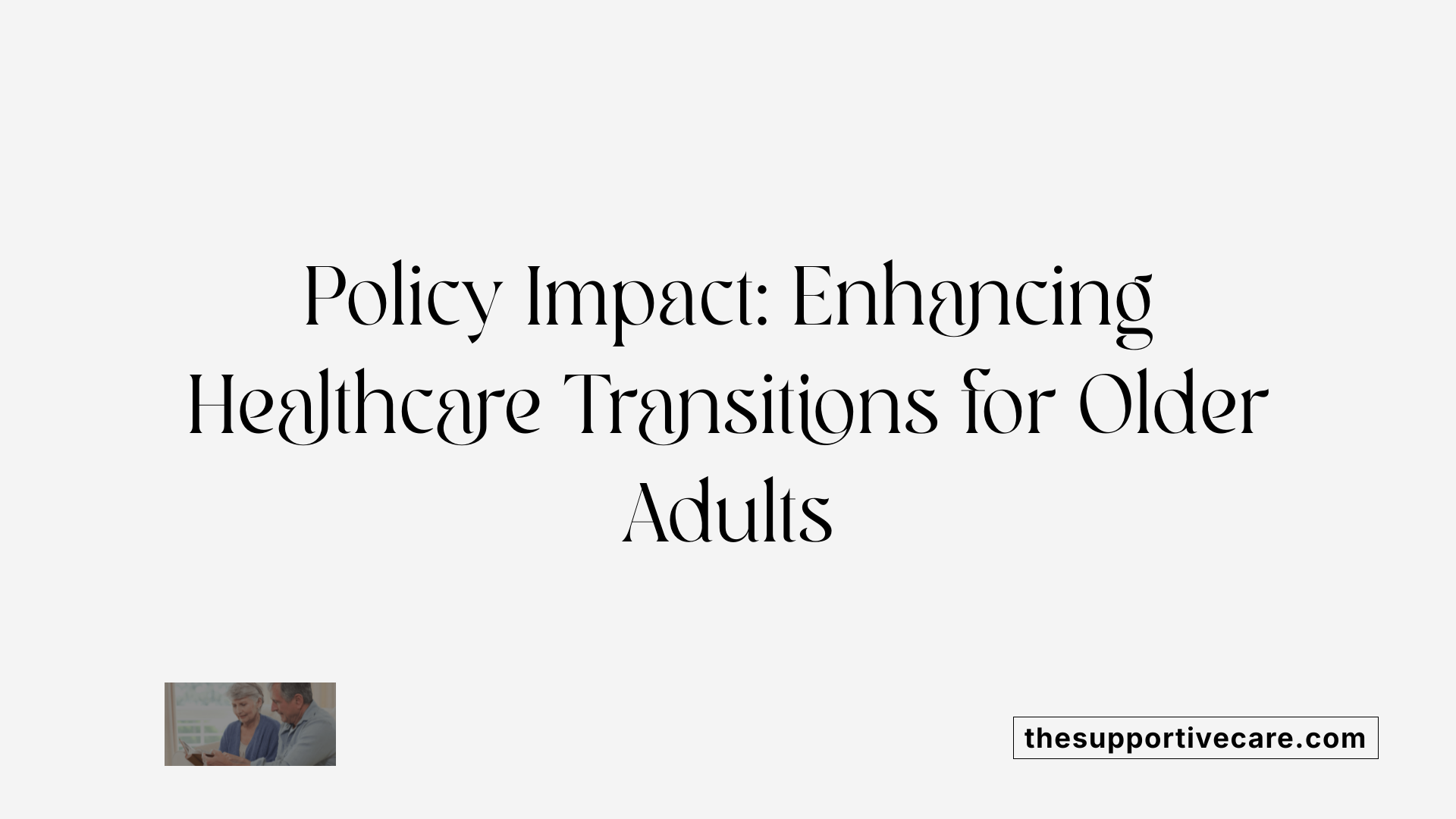 The United States has implemented various policy initiatives to support the improvement of healthcare transitions for older adults, especially in the context of mental well-being. The Affordable Care Act (ACA) plays a significant role by embedding provisions aimed at enhancing transitional care services. One of the core strategies involves performance-based incentives designed to encourage hospitals and healthcare providers to improve discharge planning, communication, and follow-up care.
The United States has implemented various policy initiatives to support the improvement of healthcare transitions for older adults, especially in the context of mental well-being. The Affordable Care Act (ACA) plays a significant role by embedding provisions aimed at enhancing transitional care services. One of the core strategies involves performance-based incentives designed to encourage hospitals and healthcare providers to improve discharge planning, communication, and follow-up care.
These incentives include reimbursements for care transition programs that aim to reduce hospital readmissions and promote continuity of care. For example, Medicare and Medicaid hospitals that demonstrate lower-than-expected readmission rates may qualify for financial rewards, motivating institutions to invest in more comprehensive discharge procedures and patient engagement strategies.
Furthermore, the ACA supports reforms that create incentives for hospitals to adopt patient-centered approaches and integrate care models, like the Transitional Care Model (TCM). These models focus on coordination, thorough patient assessments, and ongoing communication — all essential for safeguarding mental health during care transitions.
| Policy Initiative | Description | Impact on Elderly Mental Well-being |
|---|---|---|
| Medicare and Medicaid reforms | Reimbursements and penalties linked to readmission rates | Encourage development of mental health-sensitive transition protocols |
| Performance-based incentives | Rewards for hospitals with improved discharge and follow-up practices | Promote systems that address both physical and mental health needs |
| Demonstration projects and pilot programs | Test and expand innovative transitional care services | Support holistic approaches that include mental health considerations |
Collectively, these policies aim to foster healthcare environments that prioritize seamless transitions, reduce stress, and maintain mental well-being among the elderly.
The emphasis on funding and incentives drives health systems to develop better-coordinated, responsive services. This not only improves overall care satisfaction but also reduces the risks of neglect or oversight related to mental health during vulnerable periods of transition.
For further insights, searching “health policy elderly care transitions” reveals ongoing research and analysis into how policy-level changes can strengthen systemic support for elderly mental health during these critical periods.
Research Evidence on Mental Health and Care Transitions
What does research say about the impact of mental health care transitions on elderly outcomes?
Research shows that managing care transitions effectively is vital for improving mental health among older adults. Transition periods—such as moving from hospital to home or between different care settings—are vulnerable times that can affect mental health stability.
Studies indicate that well-organized transitions, which include seamless communication between healthcare providers and comprehensive discharge planning, help prevent unnecessary hospital readmissions and reduce anxiety or depression related to fragmented care.
Maintaining continuity through structured processes ensures that older adults receive consistent support and follow-up after discharge. This continuity not only improves mental health and emotional well-being but also enhances patients’ confidence in managing their conditions.
Furthermore, implementing standardized procedures—like checklists for discharge and follow-up protocols—has been shown to decrease the risks associated with lapses in care. These procedures help ensure critical information about medications, symptoms, and next steps is clearly communicated to both patients and outpatient providers.
An important development in recent research involves digital health tools and electronic health records (EHRs). These technologies facilitate real-time information sharing, enabling better coordination among multiple providers and more accurate monitoring of mental health symptoms.
Digital tools also support remote follow-up and enable patients to access resources and communicate easily with healthcare teams, which is especially beneficial for elderly patients with mobility challenges.
Finally, patient-centered approaches—focusing on individual preferences, family involvement, and tailored care plans—are gaining recognition. Such approaches promote better engagement, satisfaction, and overall health outcomes.
In summary, evidence underscores that structured, tech-enabled, and personalized transition strategies are essential for safeguarding the mental health of older populations during the care transfer process. By prioritizing coordination, communication, and patient-centered care, healthcare systems can improve stability and quality of life for elderly individuals facing multiple health challenges.
Factors Influencing Outcomes During Care Transfers
What factors influence mental health outcomes during care transfer processes?
Care transitions are a sensitive period for older adults, especially those with multiple health conditions and mental health concerns. Several elements play a crucial role in shaping mental health outcomes during these transfers.
A primary factor is the quality of communication among healthcare providers, patients, and caregivers. Clear, consistent, and transparent communication fosters understanding, reduces confusion, and diminishes anxiety associated with moving between care settings. Family caregivers are vital in this process, often acting as advocates and sources of emotional support.
Caregiver involvement not only helps in managing daily needs but also supports the emotional stability of the patient, buffering stress and vulnerability during the transition.
On the pharmacological side, medications and their transportation mechanisms can influence mental health. Certain drugs used in treatment are affected by biological transporters such as P-glycoprotein, which modulate the absorption, distribution, and elimination of medications.
For instance, activity of drug transport proteins like P-glycoprotein and enzymes such as CYP3A4 can impact drug levels in the brain, potentially affecting neurological and psychological functions. Variations in these mechanisms may lead to differences in medication efficacy or side effects, which can exacerbate or alleviate symptoms like depression or anxiety.
Effective care coordination that accounts for these pharmacological factors is essential. When medications are poorly managed during transfers, patients risk adverse effects, worsening mental health, or rehospitalization.
In summary, successful care transfers depend on a combination of interpersonal communication, caregiver engagement, and an understanding of pharmacological transport and metabolism processes. These factors collectively influence the psychological stability and overall well-being of older adults navigating complex healthcare pathways.
The Role of Family and Caregivers in Successful Transitions
How do families and caregivers influence care transitions and mental health?
Family caregivers are crucial to ensuring smooth health care transitions for older adults, especially during hospital discharge or moving between care settings. They often serve as advocates, helping communicate the patient's needs and preferences to healthcare providers. Their involvement is vital in providing emotional support, which can alleviate anxiety and depression associated with healthcare changes.
Effective family participation in discharge planning involves sharing social and mental health concerns, understanding the care instructions, and ensuring follow-up care is arranged. Transparent communication from healthcare teams encourages trust and shared decision-making, leading to better adherence to treatment plans.
Support networks created through family and community connections play a significant role in addressing psychological needs. These networks can reduce feelings of isolation, improve mental health outcomes, and help navigate complex healthcare systems. When caregivers are engaged and informed, they contribute to reducing the risk of readmissions, medication errors, and other complications.
In sum, caregiver involvement, facilitated by good communication and support, enhances the psychological well-being of elderly patients during critical transition periods. Empowering families with the right information and resources ultimately leads to more successful, safer, and less stressful care transitions.
Systematic Gaps and Barriers to Effective Care Transitions
What barriers hinder effective care transitions for older adults?
Transitions in healthcare, especially for older adults, are often fraught with challenges that can negatively impact health outcomes. Poor care coordination is a major obstacle, as fragmented services lead to miscommunication, duplicated efforts, and overlooked patient needs. For instance, incompatible electronic health systems and lack of shared information can cause delays and errors during handoffs.
Resource limitations further complicate the process. Many rural and underserved areas lack sufficient healthcare staff, outpatient services, and community support systems, making it difficult to provide comprehensive follow-up care. Limited availability of resources can result in longer hospital stays, delayed discharges, or inadequate support at home.
Policy and environmental factors also play a significant role. Unclear discharge protocols, insufficient funding for transitional programs, and lack of personnel dedicated to care coordination hinder the development of seamless care pathways. These systemic issues often leave patients vulnerable to adverse events, including medication errors, unnecessary readmissions, and deterioration of health.
Addressing these barriers requires systemic reforms such as improving health information technology infrastructure to enable better communication, increasing investment in community-based services, and establishing clear policies that support integrated care models. By tackling these systemic gaps, health systems can create safer, more efficient transitions, ultimately improving outcomes for older adults.
| Issue | Description | Impact |
|---|---|---|
| Care Coordination | Fragmented information sharing and lacking roles | Increased errors, delays |
| Resource Limitations | Staff shortages and limited services | Longer stays, poor follow-up |
| Policy & Environmental | Unclear guidelines, funding gaps | Inconsistent care, higher costs |
| Solutions | Technology upgrades, policy reforms | Safer, more coordinated transitions |
Special Considerations for Elderly with Mental and Cognitive Conditions
How do mental health issues influence care transition planning?
Mental health challenges, such as dementia and depression, have a profound impact on how care transitions are managed for older adults. These conditions often lead to difficulties in communication, making it harder for patients to express their preferences or fully understand discharge instructions. As a result, planning must be adapted to address these unique needs.
Tailored assessment approaches are essential. These include cognitive evaluations to assess mental status and emotional well-being, which inform individualized care plans. Recognizing symptoms of depression or cognitive decline early allows care teams to implement targeted interventions that enhance safety and adherence to follow-up care.
Supportive interventions play a pivotal role in ensuring smooth transitions. For example, caregiver education helps families better understand the needs of relatives with dementia or depression, enabling them to provide appropriate support at home. Behavior management strategies and environmental adaptations can help minimize confusion and agitation, reducing the risk of adverse events.
Involving mental health specialists is critical. Psychiatrists, psychologists, and social workers contribute expertise in managing mental health conditions and designing personalized plans. Utilizing specialized assessment tools, such as cognitive screening tests and depression inventories, facilitates a comprehensive understanding of the patient’s psychological state.
Overall, integrating mental health considerations into transition planning ensures that older adults with cognitive and emotional challenges receive holistic care, which improves safety, satisfaction, and health outcomes during this vulnerable period.
Emerging Technologies Supporting Care Transitions and Mental Health
What technological innovations can enhance mental health support during transitions?
Technological innovations are playing an increasingly vital role in improving care transitions, especially for older adults with mental health challenges. Digital health tools, telehealth platforms, and remote monitoring systems are at the forefront of this transformation.
Electronic health records (EHRs) facilitate the smooth exchange of information among different healthcare providers. This reduces miscommunication and ensures that all parties are aware of the patient’s mental health history, medication changes, and care plans.
Telehealth services offer ongoing mental health counseling and support after hospital discharge. This is especially beneficial for patients in remote or underserved areas, where access to mental health providers might be limited. Virtual follow-up visits help maintain continuity of care and provide immediate support when needed.
Remote monitoring systems can track behavioral and emotional indicators remotely. These systems alert clinicians to early signs of psychological distress or health deterioration, enabling timely interventions.
Together, these technological tools support proactive care, boost patient engagement, and ensure safer, more effective transitions. They help reduce the risk of relapse, readmission, and worsening mental health conditions.
In summary, innovations like digital health tools, telehealth, and remote monitoring are enhancing the quality of mental health support during transitions. They foster seamless communication, provide accessible care, and allow for early detection of issues, significantly improving outcomes for vulnerable elderly populations.
| Technology Type | Functionality | Impact on Care Transitions | Additional Details |
|---|---|---|---|
| Electronic Health Records | Integrate health data across providers | Reduces miscommunication and duplication | Supports comprehensive care planning |
| Telehealth Platforms | Offer virtual counseling and follow-up | Increases access and continuity | Especially useful in rural or remote areas |
| Remote Monitoring Systems | Track behavioral and emotional indicators | Enables early intervention | Alerts clinicians to signs of distress |
This combination of technologies creates a more connected, efficient, and responsive healthcare environment—crucial for supporting the mental health of older adults during critical care transitions.
More information can be found by searching "technology in elderly mental health care transitions"
The Interconnection Between Healthcare Policies and Care Quality
How do healthcare policies influence care transitions and mental health outcomes?
Healthcare policies such as Medicare and Medicaid reforms, quality metrics, and incentives significantly shape the quality and effectiveness of care transitions for older adults. These policies set standards and create financial motivations for health providers to improve discharge planning, communication, and follow-up care.
One major policy approach involves performance-based incentives that encourage hospitals and clinics to reduce 30-day readmission rates. When providers are monitored and financially rewarded for successful transitions, they tend to focus more on comprehensive discharge instructions, medication reconciliation, and timely outpatient follow-up. These measures help prevent complications and rehospitalizations, which can be distressing and destabilizing for elderly patients.
Furthermore, policies that emphasize quality metrics include assessments of patient experience and mental health status during and after transitions. Addressing psychological needs—such as reducing anxiety, depression, and feelings of helplessness—is vital, as poor mental health can impair recovery and adherence to treatment plans. By integrating mental well-being into these quality assessments, policymakers push providers to adopt holistic approaches that reinforce emotional and social support.
Resource allocation policies also play a crucial role; they fund care coordination, community-based services, and home care programs that facilitate smoother transitions. Policies supporting integrated care models—connecting hospitals, primary care, mental health services, and social support—are essential for ensuring continuous, patient-centered treatment.
In summary, healthcare policies influence care transitions by incentivizing quality, promoting accountability, and fostering integrated care. These efforts collectively improve mental health outcomes by reducing stress, enhancing feelings of security, and ensuring that both physical and psychological needs are addressed during these vulnerable periods.
Evaluating the Effectiveness of Transitional Care Programs
What does research tell us about the effectiveness of transitional care interventions for the elderly?
Numerous studies, including large randomized controlled trials, have explored how transitional care programs impact older adults as they move between healthcare settings. These interventions aim to reduce hospital readmissions, improve health outcomes, and enhance the overall quality of care.
Research findings suggest that even low- and medium-complexity transitional care strategies can effectively decrease the odds of hospital readmission at both 30 and 180 days following discharge. For instance, interventions that involve minimal intensive resources tend to show significant benefits in preventing early re-hospitalizations and emergency department visits.
Interestingly, higher-complexity programs, which often include comprehensive assessments, personalized coaching, and coordination among multiple healthcare providers, are associated with increased patient satisfaction and reductions in the length of hospital stays. These programs also tend to support better management of chronic conditions and mental health issues, such as depression and cognitive impairment.
However, the success of these programs heavily depends on proper implementation, personalized tailoring to each patient’s specific needs, and ongoing engagement of patients and caregivers. Moreover, research emphasizes the importance of including patient-reported outcome measures—such as self-rated health, emotional well-being, and quality of life—beyond traditional clinical metrics. This broader focus helps to better capture meaningful improvements that matter to older adults.
Overall, the evidence supports comprehensive, multidisciplinary approaches that address physical, psychological, and social needs during care transitions. These strategies can not only reduce hospital readmissions but also promote better mental health and overall well-being among elderly populations, especially during these vulnerable periods.
Addressing the Needs of Diverse Elderly Populations in Transitions
How can transitional care be adapted to meet diverse elderly populations?
Adapting transitional care to serve the varied needs of elderly populations involves multiple strategies centered on cultural competency and personalized approaches. Culturally sensitive communication ensures that patients' beliefs, languages, and health literacy levels are acknowledged and respected. This fosters trust and encourages active participation in care plans.
In rural and resource-limited settings, innovative solutions such as telehealth services, mobile clinics, and community outreach programs are essential. These methods help overcome geographical barriers, providing timely and accessible care support during critical transition periods.
Personalized care approaches tailor interventions based on individual health beliefs, social support systems, and environmental factors. Care plans that incorporate patient preferences and local resources promote adherence and reduce disparities.
In practice, this means clinicians must evaluate each patient's unique background, including cultural traditions and geographical context, to design effective, relevant transition strategies. Such tailored interventions are associated with improved health outcomes, greater patient satisfaction, and a reduction in avoidable hospital readmissions.
Summary table of adaptation strategies:
| Strategy | Focus Area | Example Interventions | Expected Outcomes |
|---|---|---|---|
| Cultural competency training | Staff and clinician education | Language services, cultural awareness workshops | Better communication, increased trust, and engagement in care plans |
| Rural healthcare innovations | Overcoming geographic barriers | Telehealth consultations, mobile health units | Improved access, reduced transportation barriers, better follow-up adherence |
| Personalized care approaches | Individual health and social context | Customized discharge plans, caregiver involvement | Enhanced adherence, reduced disparities, tailored support during transitions |
By integrating these strategies, healthcare systems can better meet the complex needs of diverse elderly populations, leading to safer, more effective care transitions and healthier aging experiences.
Key Recommendations for Optimizing Elderly Care Transitions
What are key strategies to enhance care transitions for the elderly?
Improving care transitions for older adults requires a multifaceted approach focused on better communication, coordination, and support. A primary strategy involves establishing standardized discharge processes that ensure all relevant information about the patient's health and care needs are clearly communicated to outpatient providers and caregivers.
Multidisciplinary team meetings prior to discharge can foster collaboration among physicians, nurses, social workers, and community health workers, facilitating a comprehensive transition plan.
Shared electronic health records (EHRs) are critical; they allow real-time access to patient histories, medication lists, and recent test results, reducing errors and duplication.
Actively involving families and caregivers in discharge planning and education helps build trust, ensures understanding of care instructions, and supports adherence to treatment regimes.
Leveraging technology further enhances these efforts. Telehealth consultations, remote monitoring devices, and secure messaging platforms allow continuous connection between patients and healthcare teams, enabling early detection of potential complications.
Policy reforms play a vital role as well. Incentivizing high-quality transitional care through performance-based payments and care coordination frameworks encourages healthcare providers to prioritize safe, effective, and mentally supportive transitions.
In summary, implementing standardized protocols, fostering collaboration via technology, and engaging families while supporting policy reform are essential steps toward optimizing care transitions for elderly patients, especially those with complex health needs.
Future Directions and Research Needs
What future research is needed to improve mental health outcomes during elderly care transitions?
As the landscape of elderly care continues to evolve, especially regarding mental health, there is a pressing need for targeted research to enhance outcomes during crucial transitional periods. One promising avenue involves developing personalized interventions tailored to the unique needs of specific subgroups of older adults. For instance, patients with depression, dementia, or other mental health conditions often face more significant challenges during transitions from hospital to home or between care settings.
Integrating advanced technology into transitional care models holds significant potential. Tools such as artificial intelligence (AI)-driven predictive analytics can identify individuals at higher risk of adverse mental health events, enabling proactive intervention. Wearable health devices can also monitor real-time physiological and behavioral indicators, facilitating timely support. These technological enhancements can support caregivers and health professionals in delivering more responsive and personalized care.
Furthermore, establishing standardized outcome measures, including patient-reported outcomes related to mental well-being, quality of life, and satisfaction, is essential. Current studies often vary in their metrics, making it difficult to compare interventions effectively. Incorporating robust, consistent measures will help in accurately assessing what works best.
Comparative research examining different intervention complexities—such as low, medium, and high-intensity support programs—is critical to identify cost-effective strategies that maximize benefits. Additionally, studies exploring how policy initiatives and healthcare system reforms influence care quality and patient mental health are valuable.
Overall, future research aimed at combining personalized, technological, and evaluative innovations will help develop scalable models that significantly improve mental health stability for older adults during their care transitions. This progress is vital for advancing elder care, reducing readmissions, and promoting well-being in this vulnerable population.
Building a Safer and Supportive Transition System for the Elderly
Optimizing care transitions for older adults is fundamental to safeguarding their mental health and enhancing overall well-being. Addressing systemic gaps, implementing effective models, leveraging technological innovations, and fostering policy reforms are critical steps forward. Engaging families and caregivers, ensuring personalized, culturally competent care, and continually integrating patient feedback will create a resilient, responsive healthcare environment. Future research aimed at refining interventions, measuring meaningful outcomes, and harnessing emerging technologies will be instrumental in advancing elderly care and ensuring that transitions become opportunities for support rather than sources of stress and deterioration.
References
- Care Transitions for Older Adults With Serious Mental Illness
- Effectiveness of a Care Transitions Intervention for Older Adults ...
- The effectiveness of a transitional care program for frail older adults ...
- Care Transitions in the Psychiatric Hospital: Focus on Older Adults
- Improving Care Transitions - Health Affairs
- Continuity of Care: The Transitional Care Model | OJIN
- Transitional Care Interventions From Hospital to Community to ...
- Transition of care from hospital to home for older people with chronic ...
- Successful care transitions for older people: a systematic review and ...
- Study protocol for a hospital-to-home transitional care intervention ...


































































































